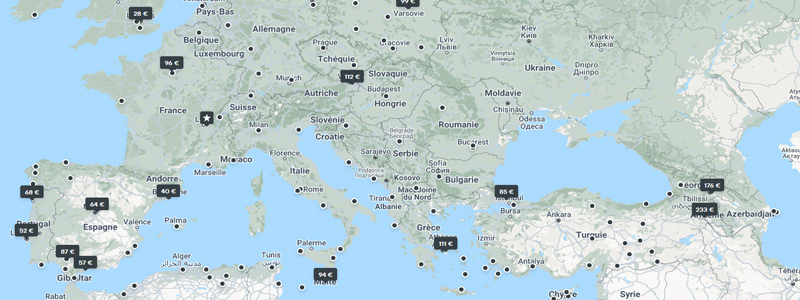Travel guide Chad
For eons, Chad has amazed and intrigued, gradually revealing itself to the daring explorers who dare to visit. The emblematic Lake Chad, a large endoreic freshwater lake on the border between Niger (to the north-west), Nigeria (to the south-west), Cameroon (to the south) and Chad (to the east), continues to attract the attention of researchers eager to decipher the mysteries of this inland sea. In 2001, the deserts of Chad revealed a spectacular secret: Toumaï, or Sahelanthropus tchadensis, repositioning Chad as a possible cradle of humanity. Imagine lakes that empty and then fill, shifting dunes, multicolored mountains and a biodiversity of immeasurable value. N'Djamena, the capital, is a bustling city where tradition meets modernity. A few hours' drive away, you can reach Zakouma National Park, a refuge for endangered African wildlife, where elephants, lions and giraffes live side by side.
This travel guide to Chad takes you on a journey through time and space, highlighting the best-kept secrets of this fascinating destination. From Tibesti to Sarh, each region offers a unique experience, welcoming accommodations and restaurants to discover. Chad is a must-see destination for the adventurous and the curious. The vast Saharan and Sudanese expanses, populated by caïlcedrats, tamarind and acacia trees and inhabited by giraffes, gazelles and baboons, offer breathtaking views. From the ephemeral dwellings of the nomads in the north to the sophisticated architectural designs of the Moundang in the south, Chad is singularly unique. To travel to Chad is to go back to the very origins of mankind.
Chadian Arabic, a widespread dialect, stretches from Tibesti to Sarh, from N'Djamena to Abéché. Of the country's 140 languages, it is the only one that unites its 13 million inhabitants. And in unison, they welcome visitors with a warm Djitandjite!meaning Welcome!
Thanks
To the members of the Office tchadien du tourisme, in particular Marabé Ngar-Odjilo, Haïkal Zakaria Djibrine and Madame Sailly in N'Djaména, Djimet Allafouza Boliké in Faya and Moussa Souleyman Djogoye in Sarh. To the team at Le Carnivore restaurant and CEFOD, and Bienvenue Allahrassem at African Parks, N'Djaména. To the soldiers of the Barkhane operation in Faya and to Mahamat Moussa Abakar, prefect of the Biltine department. To Ramadan Hamat of the Association pour la promotion des libertés fondamentales au Tchad and Fabien Yodé in Abéché. To Sara Doumgué Yamadjita Mahmat, museum curator, and Sanodji Yonbel Abiathar, director of CALF, in Sarh. And finally, thanks to all the people of Chad!
What to see, what to do Chad?
-
Book an activity
-
Customized travel
- The most beautiful cities Chad
When to go Chad ?
If you're wondering "When to go to Chad?", here are a few points to help you make your choice.
Ideal periods according to climate
The best time to visit Chad is from October to April. During this period, the climate is more pleasant, especially in the desert north where temperatures become bearable. From May to September, on the other hand, is the rainy season in the south. It is characterized by regular downpours, making certain journeys difficult due to flooded roads.
High/low season rates
When should you travel to Chad? The high tourist season generally runs from November to March. This is when accommodation prices rise. If you're looking for more affordable deals, consider a trip during the low season, between April and October. But bear in mind the climatic constraints mentioned above.
Notable events
If you travel to Chad in December, you'll be able to attend the National Holiday on December1, a highlight of Chadian culture. Other traditional events may also punctuate your trip, depending on the region and the month.
Regions
North (Tibesti region): the months from October to February are ideal. Temperatures are mild, giving you the chance to explore the Tibesti mountains in good conditions. Avoid the extremely hot summer months.
South (Moundou region): leave between November and May. The rainy season, while offering lush green landscapes, complicates travel.
The best time to travel to Chad depends on your budget and the experiences you wish to enjoy. Let's hit the road!
Suggested addresses Chad
Travel Chad
-
Find a hotel
-
Car Rental
-
International e-SIM package
-
Find a local agency
Voici quelques idées d’itinéraires qui vous permettront de découvrir le désert, d’avoir un aperçu du Sahel et de partir quelques jours pister les animaux sauvages de Zakouma… Pour ceux qui habitent sur place ou qui disposent d’un peu plus de temps, vous pouvez compléter votre tour du Tchad par une petite virée dans le Sud. Il convient toutefois d'avoir à l'esprit que la durée des itinéraires proposés est indicative : elle peut varier selon la saison et le mode de transport. Le nombre de jours estimé pour chaque itinéraire a été calculé sur la base de conditions de circulation optimales et de déplacements en voiture (ou 4x4) avec guide-mécanicien chevronné. Par ailleurs, les circuits suggérés sont basés sur les points d'intérêt écologiques, archéologiques ou historiques qu'offre le Tchad et non pas sur les aspects sécuritaires. Il importe donc de se renseigner auprès des autorités compétentes avant d'entreprendre l'un de ces séjours.
Find unique Stay Offers with our Partners
How to go Chad
How to go alone
Going it alone in Chad is a daring adventure for the intrepid soul. Without the constraints of a group or a fixed itinerary, you're free to explore at your own pace. Start in N'Djamena, the bustling capital, before venturing further afield. Equip yourself with reliable maps, familiarize yourself with local customs and learn a few basic words in Chadian Arabic:
Salam: Greetings / Peace
Shukran : Thank you
La: No
Naam: Yes
Maafi: There is no / Not available
Maa ismuka ?: What's your name?
Ismi ... my name is...
Kam ? how much?
Maa hadha: What is it?
Mumkin : Possible
La Mumkin: Impossible
Maa' al-Salaama: Goodbye
Plan your itinerary, taking into account distances and the availability of resources. Carry sufficient water and provisions, and always inform someone of your travel plans. This solo adventure in the heart of Africa offers an authentic and unforgettable experience.
How to go on a tour
Organized trips to Chad offer a memorable, hassle-free experience. Specialized agencies offer well-designed itineraries that allow you to discover the hidden treasures of this unique destination, from the mythical Lake Chad to the breathtaking desert landscapes. By opting for an organized tour, you benefit from the expertise of local guides who know the terrain, customs and history of the country. What's more, all the formalities, from accommodation to travel, are taken care of for you. It's an ideal option for those who want deep immersion without the logistical worries.
How to get around
Cabs are a convenient way to get around Chad, especially in the capital, N'Djamena, but you just need to negotiate the fare before departure. For longer journeys, buses and shared trucks are popular, but overcrowded and less comfortable. Car rental is possible, but opt for an off-road car, especially if you plan to leave the main roads. Tracks are difficult during the rainy season. River travel is another scenic option, especially on the Chari River. Whatever your method of travel, good planning and a degree of flexibility will help you get around this beautiful and complex country.
Discover Chad
Chad is a large country with a richly diverse territory, home to numerous ethnic groups, some of them nomadic, each with their own particularities and often their own language. To help you discover all the nuggets of this beautiful country, the following pages present the most important facets of each subject likely to interest you. The diversity of the flora and fauna, an overview of the country's history, an insight into religious beliefs and ancestral traditions, and much more. Whether you're interested in the desert, wildlife or the origins of mankind, you'll find all the information you need to make sure you don't miss out on anything important during your trip, or to prepare for it before you leave. We wish you all the best for your discovery of this little-known country, where tourism is still in its infancy.
The 12 keywords Chad
1. Ball

The boule is the traditional Chadian dish par excellence. Whether made from millet, sorghum, rice or other cereals, it's the staple diet of a traditional Chadian family. Made from cereal flour, water and salt, it's as easy as can be to prepare and accompanies sauces and stews.
2. Road cutters
These are the highwaymen who ambush vehicles on the roadside and rob the occupants. There are quite a few of them in the country, and some roads, such as the one between Sahr and Zakouma National Park, should be avoided without an escort. In the event of ambush, it is advisable not to resist.
3. Gasoline

Alongside conventional petrol stations, you'll find roadside stalls displaying bottles of various sizes containing petrol that's cheaper than the traditional network. Beware: the contents of these fuel bottles are not certified by anyone, and original blends are quite common.
4. Gueltas
An Arabic term for surprising pockets of water dug into the sand or sandstone and fed by the rare rains that make the Sahara so exceptional. These gueltas, the fortresses of the Chadian desert, are usually guarded by stunningly shaped rocks. In the heart of the Ennedi lies the most famous, the Guelta d'Archei.
5. Guerbes
Arab term for the large goatskin wineskins used by nomads to carry fresh water during their meharées. They were generally made by women, but it's hard to find them nowadays as they've been replaced by containers that are unfortunately mostly made of plastic.
6. Kanoun
What Chadians call a kanoun is actually quite different from the traditional clay kanoun so common in North Africa. The Chadian kanoun is generally a simple iron receptacle in which charcoal is placed. The whole thing is covered with a grate on which the cook places her frying pan or stewpot.
7. Merchandising
Bargaining is a well-practiced art in African markets, and Chad is no exception. So never hesitate to negotiate a price - the seller will respect you all the more. In any case, when you pretend to leave, you'll often get the floor price from the shopkeeper who doesn't want to miss out on a sale.
8. Matabich
Matabich, better known to us as bakshish, is a fairly common practice to facilitate all kinds of procedures. Customary chiefs may also charge you a fee if you ask them for the right to visit a specific area within their jurisdiction. Magazines and medicines are often useful.
9. Méharée

This term comes from the Arabic méhari, which designates the saddle dromedary, the one used for desert travel. It is the noble animal par excellence. White, slender and haughty-looking. A méharée was originally an expedition on the back of a dromedary, and nowadays, by extension, an expedition in all-terrain vehicles.
10. Nassara
A term frequently used in Chad to designate light-skinned visitors. This expression, which you'll often hear in the mouths of children as you wander around, comes from the Peul ethnic group, who were the first to refer to these light-skinned people, who constantly referred to Jesus of Nazareth, as Nassara.
11. Tracks

Chad does not have a very efficient road network. The main roads are sand tracks in the desert and dirt tracks in the rest of the country, which is a real handicap for domestic travel, especially during the rainy season. A local guide is strongly recommended when venturing onto these tracks.
12. Rackcha
Small three-wheeled vehicles used as cabs in most towns. Since the beginning of the 21st century, they have become widespread, starting with the city of Abéché, and compete fiercely with the famous "clandos", which are less comfortable and more dangerous. The name Rackcha is derived from the word Rickshaw, which designates these vehicles in Asia.
You are from here, if...
You make an effort to greet people you meet in their local language.
You remove your shoes before entering a house to which you are invited.
You like and play Mancala-style seeding games, such as Awele, Bao or Kalaha.
You like to spend weekends in the countryside, working your own land or that of a friend.
You share your meal with visiting friends, without any formalities.
You consult a marabout for advice on all matters relating to your family and social life.
You wear a big smile in all circumstances. Complicated situations can only improve when approached with a smile.
You never forget a good supply of drinking water before setting off, because the desert never forgives approximations.
You count distances in hours, not kilometers.



















